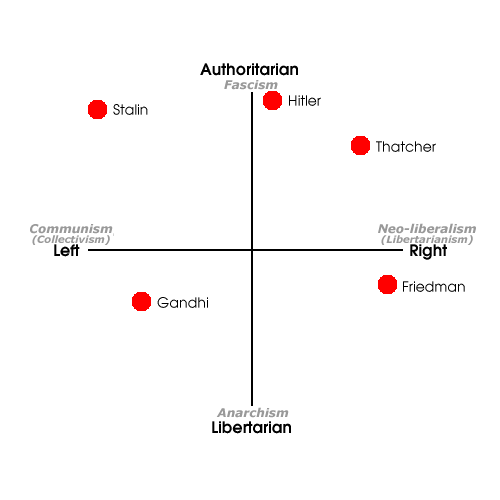- Joined
- Mar 5, 2008
- Messages
- 114,553
- Reaction score
- 63,305
- Location
- Sarasota Fla
- Gender
- Undisclosed
- Political Leaning
- Undisclosed
This idea started from this thread: http://www.debatepolitics.com/us-partisan-politics-and-political-platforms/149166-you-liberal.html
The quiz linked in that thread, was to mind mind just terrible. It basically took a bunch of issues and assigned a liberal position to those issues, and tried to determine if some one was then a liberal. I scored straight up conservative on the quiz. It got me thinking that not only was the problem that the person who designed the quiz had no real clue about liberal ideology, but more importantly that the quiz tried to decide ideology based on positions on the issues, which I think does not work. Both a liberal and a conservative can agree 100 % on an issue, but they will arrive at that position in different ways. One example would be SSM, where for a liberal SSM is beneficial to society and as such should be legal, while for a conservative the government should limit when it tells people who they can or cannot marry kinda thing(phrased poorly I know).
So what I did was try and come up with a quiz question that I thought would show the basic philosophy behind the ideology. I assumed that the basic difference between liberals and conservatives was the level of government intervention, the size of government appropriate, and with that tried this question:
The question fails miserably in large part because it tries to do too much in one question. I do however like the concept of a quiz that tries to measure the background philosophy as opposed to simply the stance on issues. It is a kinda neat mental exorcize. SO with that in mind, my question: What questions would you ask on a quiz to determine if some one is liberal or conservative, and what do you think is that underlying philosophical difference? If we get some good responses here(oh, I am so hoping), I will edit them into this OP and we can see if we can put together a good quiz instead of all the crap ones online.
The quiz linked in that thread, was to mind mind just terrible. It basically took a bunch of issues and assigned a liberal position to those issues, and tried to determine if some one was then a liberal. I scored straight up conservative on the quiz. It got me thinking that not only was the problem that the person who designed the quiz had no real clue about liberal ideology, but more importantly that the quiz tried to decide ideology based on positions on the issues, which I think does not work. Both a liberal and a conservative can agree 100 % on an issue, but they will arrive at that position in different ways. One example would be SSM, where for a liberal SSM is beneficial to society and as such should be legal, while for a conservative the government should limit when it tells people who they can or cannot marry kinda thing(phrased poorly I know).
So what I did was try and come up with a quiz question that I thought would show the basic philosophy behind the ideology. I assumed that the basic difference between liberals and conservatives was the level of government intervention, the size of government appropriate, and with that tried this question:
For any given problem with the country, the most likely best solution is:
A) Government intervention
B) Government deregulation
The question fails miserably in large part because it tries to do too much in one question. I do however like the concept of a quiz that tries to measure the background philosophy as opposed to simply the stance on issues. It is a kinda neat mental exorcize. SO with that in mind, my question: What questions would you ask on a quiz to determine if some one is liberal or conservative, and what do you think is that underlying philosophical difference? If we get some good responses here(oh, I am so hoping), I will edit them into this OP and we can see if we can put together a good quiz instead of all the crap ones online.

